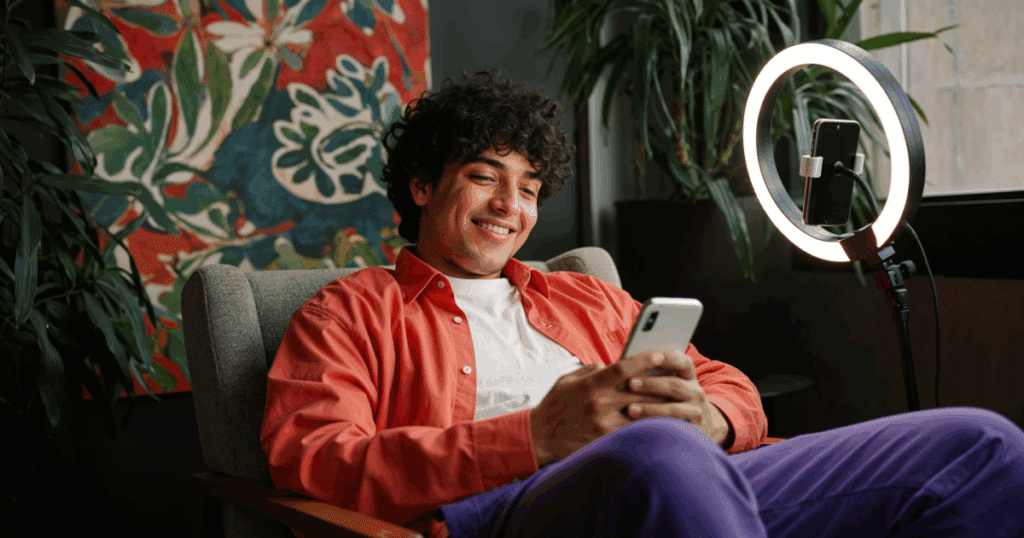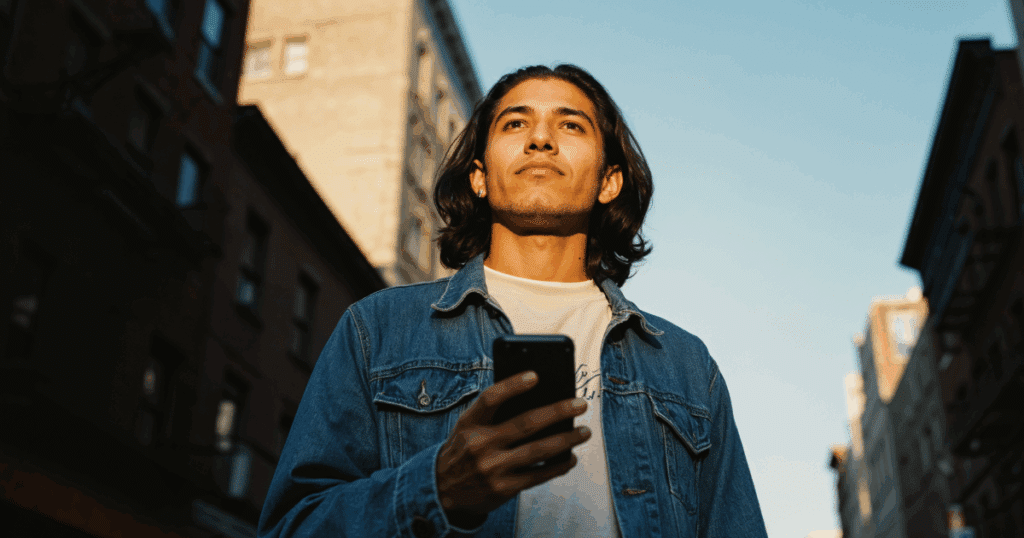Typically, the general public doesn’t have to know that you must get a root canal or that your grandma died.
Whenever you’re on-line and make your story public, some folks consider monetized authenticity is the price of the deal and that the necessity for private boundaries is off as a result of the model was created with the ups and downs of life because the product. In keeping with a 2023 report from the Pew Analysis Heart, roughly 41% of U.S. adults who comply with influencers say they really feel like they “personally know” the folks they comply with, regardless of by no means having interacted with them.
That stat alone explains the strain. To complicate issues additional, you may have a following as a daily particular person, making cool stuff. Nonetheless, there’s additionally the complicated relationship between folks and creators in weak areas like trauma, intercourse ed, and psychological well being, the place folks really feel extremely related out of emotional want.
Blurred Traces

The blurred traces between efficiency, persona, and personhood are palpable within the consideration economic system as a result of, as folks bond with a creator as one thing greater than only a particular person making social media content material, they see them as connectors of their experiences. One examine from Cornell discovered that creators in “emotional labor sectors” like psychological well being and self-help expertise 27% extra parasocial engagement than creators in life-style or comedy areas. That depth comes with penalties.
One of many points with on-line life is that there’s a false binary of followers getting access to a creator’s on a regular basis expertise versus the truth that what they provide the general public is a curated expertise of their lives inside the boundaries of what they wish to present. Whereas not the identical platform, it’s much like what Anthony Bourdain went by way of. Folks felt they knew him deeply as a result of they shared his experiences, however he mentioned in one among his episodes, “The digital camera is a liar. It exhibits all the pieces. It exhibits nothing. It reveals solely what we wish.”
And thru that narrative, we realized that we noticed the world by way of a skewed lens. For creators, that is related as a result of they wish to share their vulnerability, however that comes at the price of experiencing life as a standard particular person. Creators begin to view life by way of the lens of what that viewers desires an expertise to be — a building, one thing put collectively for mass clicks — as a substitute of actuality.
How we understand the boundaries to the self isn’t a transfer to the again or the entrance, it’s transferring the road the place the topic feels comfy and what they’re keen to share in a weak area.
The Value of “Friendship”

Folks on the web don’t have any chill. Emma Chamberlain briefly had a paid messaging characteristic on her web site the place followers may pay $10,000 to obtain a private e-mail from her. It was clearly a placeholder/take a look at gone improper — or, at worst, a joke — however followers took it extraordinarily significantly. She was instantly swarmed with outrage, assume items, and emotional essays from followers who felt betrayed that she’d “monetize friendship.”
Followers and followers misplaced it as a result of the phantasm of intimacy was considered as transactional. Chamberlain’s workforce vehemently denied this was even legit; they mentioned the e-mail possibility was a part of a placeholder {that a} designer was engaged on, and it bought into the general public sphere. In a world the place Rick and Morty followers stormed McDonald’s over Szechuan sauce, you’d wish to assume this was a one-off of madness, however sadly, folks can go banana city over the littlest cracks within the constructed actuality.
Knowledge privateness issues blur the road between creators as public figures and weak people. Creators construct careers by sharing intimate slices of their lives, whether or not every day routines, psychological well being battles, and even the rollercoaster of relationships. Nevertheless, in doing so, they develop into prone to parasocial attachment and invasive knowledge harvesting.
Platforms gather granular behavioral knowledge from each creators and their audiences: likes, location tags, viewing occasions, and even emotional sentiment inferred from posts, and use it to coach algorithms that form what’s seen, when, and by whom. (Massive time creepy, tbh.)
For creators, this implies their id isn’t simply broadcast however quietly commodified behind the scenes. And whereas influencers could select to put up a crying video or share a private second, they usually have little say in how that content material — and the metadata behind it — is mined and monetized.
The paradox is that this: the extra genuine a creator is on-line, the extra their private knowledge turns into a commodified product. They’re not simply navigating visibility; they’re negotiating digital vulnerability.
Success Tales: Creators Who Keep Boundaries

Whereas not a web based creator within the conventional sense, Chappelle Roan had phrases about folks overstepping into her private, on a regular basis life: In August 2024, she addressed situations of “predatory habits” from followers, emphasizing that such actions are unacceptable.
Roan said, “I don’t care that this loopy kind of habits comes together with the job, the profession discipline I’ve chosen. That doesn’t make it OK. That doesn’t make it regular. That doesn’t imply that I need it. That doesn’t imply that I prefer it.” She additional expressed her discomfort with the belief that familiarity together with her work equates to her private data, remarking, “It’s bizarre how folks assume that you recognize an individual simply since you see them on-line and also you take heed to the artwork they make. That’s f—ing bizarre.”
Extra creators are constructing “zones of privateness” to guard their well-being in a tradition that calls for whole transparency. In a 2023 Adobe survey, 62% of creators mentioned they really feel strain to share extra of their private life than they’re comfy with, whereas almost half (47%) mentioned sustaining boundaries is important to keep away from burnout.
John Inexperienced, longtime YouTuber and novelist, articulated this shift clearly: “There are issues I wish to preserve only for myself, and that’s not me being dishonest, it’s me being entire.” Whether or not it’s creators refusing to indicate their companions or youngsters, taking months-long breaks, or setting arduous traces round real-time posting, the development displays a deeper understanding that parasocial intimacy doesn’t require full entry. As the road between private content material and emotional labor blurs, these privateness zones have develop into protecting and radical.
For some, it’s vital to regulate the narrative with out revealing all the pieces about their lives. Not everybody must understand how the go to to the proctologist went. So, for a lot of, what that channel illustrates is the top recreation of what folks can see and expertise.
Making a social contract with followers and followers
Some creators are transferring past passive boundaries and coaching their audiences by way of neighborhood agreements: express expectations round engagement, respect, and emotional labor. These agreements may be pinned posts, “home guidelines” in video captions, or written neighborhood tips on platforms like Patreon, Discord, or Substack. The concept isn’t simply moderation; it’s a form of culture-setting.
Creators like YouTuber ContraPoints embody detailed disclaimers about what sorts of discourse are welcome and what crosses a line. In distinction, streamers on Twitch usually embody “don’t trauma dump” of their bio or chat guidelines to keep away from emotional overload. These agreements assist reframe the connection between creator and follower as a mutual alternate fairly than an open emotional faucet.
In a 2022 Patreon creator report, 58% of creators mentioned setting expectations improved their expertise on the platform, whereas these with written neighborhood requirements reported considerably decrease burnout. Establishing boundaries upfront fashions wholesome relational dynamics and makes Crystal Pepsi clear that entry is a privilege, not a proper, defending the creator and the integrity of the area they’re constructing.
The Way forward for Creator Privateness

Creators are utilizing technical methods to guard their peace whereas staying seen. This contains organising separate “public” and “private” accounts, one for his or her family and friends and an account for individuals who are simply within the cheering part. Some folks have to schedule content material prematurely, outsource remark moderation or DMs to trusted workforce members, or use Manychat. (Shameless plug.)
It’s not simply time administration; it’s emotional boundary work. In keeping with a 2023 Later.com survey, 67% of full-time creators mentioned scheduled content material helped cut back anxiousness and choice fatigue. Streamer and psychological well being advocate Mxiety has spoken about how delegating engagement duties saved her from burnout, saying, “I needed to cease studying feedback stay. I can’t give my finest to the individuals who care about me if I’m at all times bracing for the subsequent blow.”
The purpose isn’t to be much less current, it’s to be extra intentional about presence.
Creators are leaning into seasonal posting schedules, collective content material drops, and platforms prioritizing slower, extra curated engagement. Metalabel, for instance, operates like a inventive co-op, the place artists launch work in themed batches, share credit score, and cut back the strain of fixed output. The mannequin shifts visibility from particular person grind to shared momentum. A 2024 Nielsen Creator Tendencies report prompt that over 40% of creators below 30 are experimenting with collective releases or staggered publishing as a type of burnout prevention.
These methods replicate an even bigger query: do we have to redefine what “success” appears to be like like within the digital area? As one creator within the report mentioned, “Going viral isn’t value it if I’m not OK.”
The way forward for creator psychological well being
This brings us to one thing greater than scheduling apps: Ought to weak area creators, these sharing content material round psychological well being, trauma, sexuality, and id, have further protections? Proper now, platform coverage affords little help. Algorithmic programs reward engagement, not consent. Harassment, doxxing, and emotional overreach aren’t edge instances; they’re vanguards within the system.
A 2022 examine from the Heart for Democracy & Know-how discovered that 1 in 3 creators in these classes skilled focused harassment, with 52% saying platforms failed to reply adequately. However the accountability isn’t solely on tech firms. Audiences even have a task in shaping a respectful tradition. Neighborhood agreements, boundary posts, and clear phrases of engagement are useful, however they require buy-in. The way forward for a wholesome creator tradition would possibly hinge much less on pushing content material and extra on mutual accountability.
As author Anne Helen Petersen mentioned, “If we wish intimacy on-line, we have to construct it on phrases that protect humanity, not erode it.”
The Steadiness Between Privateness and Connection

Privateness isn’t the enemy of expression, nevertheless it shouldn’t be a misnomer towards what folks maintain sacred, and for some, that’s their privateness. Followers and followers ought to embrace no matter traces creators put within the sand; it’s not for any cause aside from not everybody must know all the pieces about your life. Some traces are there for private safety, and because the world of actuality and the web ever blur, it’s totally OK for them to ask.
As a result of actually, ask your self: would you like everybody to know all of your enterprise? Most likely not. What you do within the shadows is nobody’s enterprise however yours. Survival is one factor, however the way you management how shut the digital camera will get is one other. That’s possession of the self.
Probably the most radical act could also be drawing boundaries round our willingness to share.

